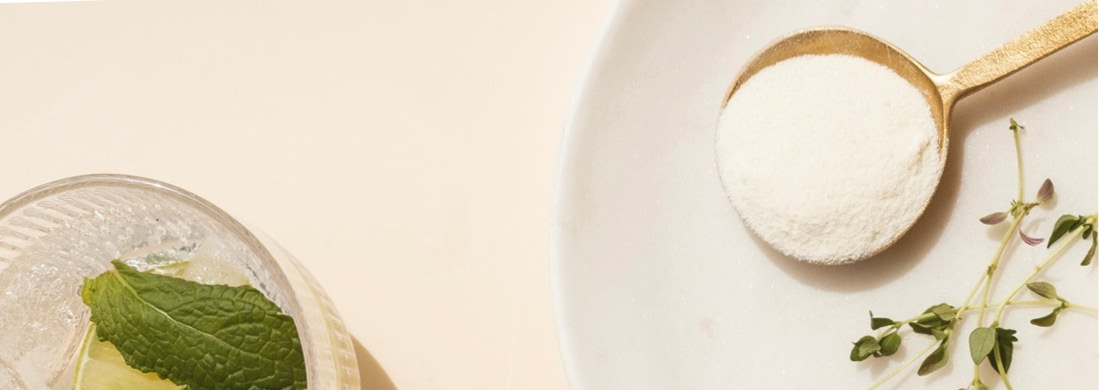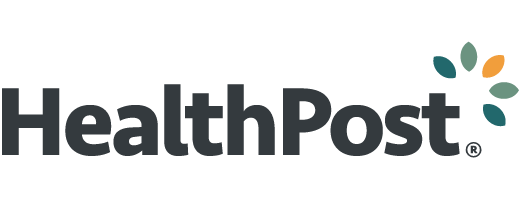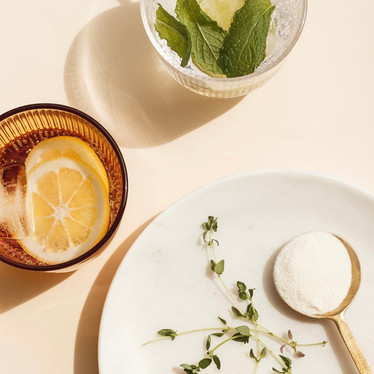
The collagen trend is here to stay, and with reports far and wide of thick healthy hair, long strong nails, and hydrated plump skin, it’s for good reason. But what else is there to know about collagen - how does it work, where does it come from, and which collagen is best for you?
What is collagen?
Collagen is a protein that is naturally found in the skin and other organs. Together, collagen forms a kind of matrix that helps to provide structural integrity to the skin and other structures in the body. It’s essential for keeping everything in place and aiding in firmness and elasticity. Collagen is made up of various amino acids but is particularly rich in proline, glycine and hydroxyproline.
As well as being a major protein component in skin, collagen is also present in hair, nails, bone and muscles. Collagen is so abundant it makes up about 30% of the protein components in our body.
In mammals, collagen is one of the key components of any connective tissue and can be found in high concentrations throughout the body. However, as we age the amount of collagen produced by the body begins to slow down. This means the inner layer of the skin starts to lose collagen, and this renders the skin more vulnerable to damage, wrinkles, and being less hydrated.
Collagen supplements have become incredibly popular as people see their hair, nails, and skin benefit from taking it. Collagen comes in different forms from unflavoured to flavoured powders that can be added to drinks like Matcha or coffee, or as liquid and capsules.
Because collagen is naturally found in the skin and around joint tissue, collagen peptides are sourced from animals, so are not suitable for people following a vegan or vegetarian lifestyle.
What are the benefits of collagen?
When collagen production declines or when the body doesn’t make collagen properly, the whole body can be negatively impacted. Collagen is part of our connective tissue – it is everywhere in the body.
- Movement and mobility: Collagen supports muscles and bones with good strength and flexibility
- Circulation: Our arteries and veins depend on collagen within their wall lining to speed up or slow down the movement of blood around the body
- Holding structures in place: Our organs are positioned and supported with the structures that collagen is made of. Our bones are connected to muscles and each other by tendons, ligaments, and joint tissue, all of which contain collagen
- Wound healing: Collagen acts as scaffolding for different stages of wound healing. Our wounds heal and are held in place thanks to collagen
- Skin health: Collagen plays an essential role in the elasticity of the skin; a lack of this protein results in changes in the skin’s strength and texture. Skin can become less firm, more wrinkled and lined and other effects associated with the ageing process can start to appear
Increasing your intake of collagen in foods can replenish the natural amount of this protein in the body and support the skin’s own recovery process.
What age should you start taking collagen and how much collagen is needed daily?
For most people, at age 25 our skin feels youthful, firm, and signs of ageing haven’t made an appearance. However, age 25 is when your body’s collagen production begins to slow down and with that, your skin’s ability to retain its youthful plumpness and hydration diminishes, and fine lines, wrinkles and sagging start to appear. In addition to using quality skin care, taking collagen can become a daily addition to your routine to support collagen health.
There are other reasons why collagen can become damaged through lifestyle and diet. Find out 7 reasons why collagen declines as you get older.
Research is showing that the beneficial amount of collagen to take can vary between 2.5 gm – 12gm daily. This is approximately ½ to 3 teaspoons of collagen powder. Collagen is a well-tolerated product to take long-term, and also appears to be suitable for pregnant women.
What are the different collagen types?
There are approximately 16 types of collagen in the body, but the most prevalent are types I, II, and III. The different collagen types have slightly different functions throughout the body.
- Type I is a large component of bone and helps to anchor the teeth within the jaw.
- Type II collagen provides support and flexibility within joints.
- Type III collagen is present in soft tissue and supports wound healing and tissue formation.
It doesn’t matter which type you consume, as your body is still receiving the main ingredients (amino acids) needed to put it back together as the type your body requires.
Collagen products are derived from marine or bovine species and the collagen is considered a by-product of these animals being used for food. Look for products that are using sustainably caught fish or grass-fed cows.
Easy ways to introduce collagen into your day
Collagen is available in so many forms, there’s something for everyone! It’s always a good idea to start with good nutrition though. There is a lot of collagen in food. It’s important to ensure adequate protein sources rich in proline, hydroxyproline, and glycine. These amino acids can be found in:
- Protein powders
- Cheese (cottage, cream, Colby, parmesan)
- Cabbage
- Yoghurt
- Lamb
- Chicken
- Beef
- Venison
- Spirulina
- Legumes
Collagen powder is very easy to add to smoothies or other drinks and comes in a variety of flavours like Pineapple & Coconut, Berry, Wildflower, or for the ultimate in convenience unflavoured. Coffee creamers are an easy addition to the morning coffee and offer delicious flavour and a protein hit.
Collagen recipes are everywhere, and collagen powders can be added to baking, bliss ball recipes, soups, stews, ice blocks, and even cheesecake.
A quick note on the powders - Collagen isn’t a complete source of protein so shouldn’t be relied on as a sole source of protein. It’s missing some of the essential amino acids that your body can use to make the protein structures you need.
If a powder isn’t your thing, we have a range of capsules available with high quality ingredients like phytoceramosides that support the skin.
Collagen for Vegetarians
For those leading a plant-based lifestyle, there are still great options for supporting collagen health. As well as the relevant food suggestions above, taking a good quality Vitamin C supports the production of collagen and is a well-utilised antioxidant in the body. Minerals zinc and silica are great co-factors for the production of collagen, and a plant-based protein powder will ensure you have the amino acids available for your body to make the collagen it needs.
With countless collagen options available it can feel overwhelming to make a choice that's best for you. Take a look at our range and consider how the different types, form, and flavours best meet your health goals and lifestyle. Ask yourself some simple questions like how you'd like to consume it, and what benefits you're looking for.
Whichever choice you make, collagen plays an important role in our bodies and should always be taken as part of a well-balanced diet.

